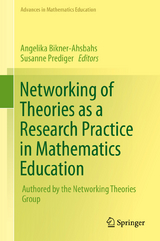Networking of Theories as a Research Practice in Mathematics Education
Springer International Publishing (Verlag)
978-3-319-05388-2 (ISBN)
How can we deal with the diversity of theories in mathematics education? This was the main question that led the authors of this book to found the Networking Theories Group. Starting from the shared assumption that the existence of different theories is a resource for mathematics education research, the authors have explored the possibilities of interactions between theories, such as contrasting, coordinating, and locally integrating them.
The book explains and illustrates what it means to network theories; it presents networking as a challenging but fruitful research practice and shows how the Group dealt with this challenge considering five theoretical approaches, namely the approach of Action, Production, and Communication (APC), the Theory of Didactical Situations (TDS), the Anthropological Theory of the Didactic (ATD), the approach of Abstraction in Context (AiC), and the Theory of Interest-Dense Situations (IDS).
A synthetic presentation of each theory and their connections shows how the activity of networking generates questions at the theoretical, methodological and practical levels and how the work on these questions leads to both theoretical and practical progress. The core of the book consists of four new networking case studies which illustrate what exactly can be gained by this approach and what kind of difficulties might arise.
PART A: Introduction.- Chapter 0: Susanne Prediger & Angelika Bikner-Ahsbahs: Preface.- Chapter 1: Angelika Bikner-Ahsbahs, Susanne Prediger, Michèle Artigue, Ferdinando Arzarello, Marianna Bosch, Tommy Dreyfus, Stefan Halverscheid, Mariam Haspekian, Ivy Kidron, Alexander Meyer, Cristina Sabena, & Ingolf Schäfer: Starting points for dealing with the diversity of theory.- Chapter 2: Cristina Sabena: Description of the data: Introducing the session of Ciro, Gabriele and the exponential function.- PART B: Diversity of theories.- Chapter 3: Ferdinando Arzarello & Cristina Sabena: Introduction to the approach of Action, Production and Communication (APC).- Chapter 4: Michèle Artigue & Mariam Haspekian & Agnes Lenfant: Introduction to the Theory of Didactical Situations (TDS).- Chapter 5: Marianna Bosch & Josep Gascon: Introduction to the Anthropological Theory of the Didactic (ATD).- Chapter 6: Tommy Dreyfus & Ivy Kidron: Introduction to Abstraction in Context (AiC).- Chapter 7: Angelika Bikner-Ahsbahs & Stefan Halverscheid: Introduction to the Theory of Interest-Dense Situations (IDS).- PART C: Case studies of Networking.- Chapter 8: Susanne Prediger & Angelika Bikner-Ahsbahs: Introduction to networking: Networking strategies and their background.- Chapter 9: Tommy Dreyfus, Cristina Sabena, Ivy Kidron, Ferdinando Arzarello: The Epistemic Role of Gestures - A case study on networking of APC and AiC.- Chapter 10: Ivy Kidron, Michele Artigue, Marianna Bosch, Tommy Dreyfus, Mariam Haspekian: Context, milieu and media-milieu dialectic - A case study on networking of AiC, TDS, and ATD.- Chapter 11: Cristina Sabena, Ferdinando Arzarello, Angelika Bikner-Ahsbahs, Ingolf Schäfer: The epistemological gap - A case study on networking of APC and IDS.- CHAPTER 12 Angelika Bikner-Ahsbahs, Michèle Artigue & Mariam Haspekian: Topaze Effect - A case study on networking of IDS and TDS.- PART D: Reflections.- Chapter 13: Stefan Halverscheid: Beyond the official academic stage - Dialogical intermezzo.- Chapter 14: Angelika Bikner-Ahsbahs & Susanne Prediger: Networking as research practices : methodological lessons learnt from the case studies.- Chapter 15: Michèle Artigue & Marianna Bosch: Reflection on Networking through the praxeological lens.- Chapter 16: Kenneth Ruthven: From networked theories to modular tools?.- Chapter 17: Luis Radford: Theories and their networking - A Heideggerian commentary.- Appendix.- Index.
"The Networking Theories Group has produced a highly commendable book for anyone interested in theories in mathematics education. ... for those with an open mind and willingness to make this effort, a lot could be learned. ... this book is a forerunner for more such work, not only on networking but also on the emergence of new theories or development of existing ones." (Arthur Bakker, Educational Studies in Mathematics, Vol. 93, 2016)
| Erscheint lt. Verlag | 4.9.2014 |
|---|---|
| Reihe/Serie | Advances in Mathematics Education |
| Zusatzinfo | XII, 329 p. 124 illus. |
| Verlagsort | Cham |
| Sprache | englisch |
| Maße | 155 x 235 mm |
| Gewicht | 651 g |
| Themenwelt | Geisteswissenschaften ► Philosophie ► Erkenntnistheorie / Wissenschaftstheorie |
| Mathematik / Informatik ► Mathematik | |
| Sozialwissenschaften ► Pädagogik ► Schulpädagogik / Grundschule | |
| Schlagworte | Abstraction in Context (AiC) • Action, Production and Communication Theory (APC) • Anthropological Theory of the Didactic (ATD) • Connecting math education theories • Diversity of didactical theories in math education • Epistemic processes in mathematics education • Interest Dense Situation Theory (IDS) • Networking as research practice • Networking theories in mathematics education • Semiotic resources in the classroom • Social interactions in mathematics classes • Theory of Didactical Situations (TDS) • Topaze effect |
| ISBN-10 | 3-319-05388-4 / 3319053884 |
| ISBN-13 | 978-3-319-05388-2 / 9783319053882 |
| Zustand | Neuware |
| Haben Sie eine Frage zum Produkt? |
aus dem Bereich



![Was heißt Denken?. Vorlesung Wintersemester 1951/52. [Was bedeutet das alles?] - Martin Heidegger](/media/113619842)
